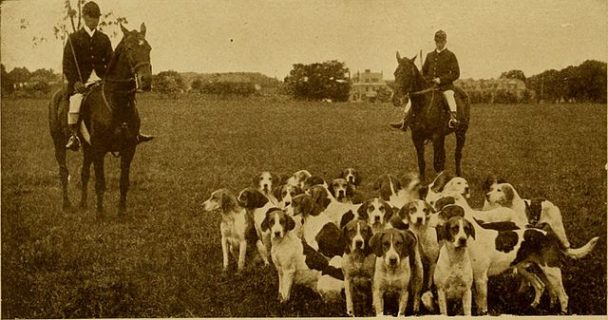
It’s a disservice to an ancient breed to be known by another breed name, but given that so many people mistake a Harrier for an oversized Beagle or an undersized Foxhound, we suppose the moniker of “Super Beagle” is understandable, but the Harrier is “super” in its own right.
Two different types of hound were bred over several centuries for their working qualities related to the hare, and the Harrier was one of them. Believed to have been developed in 13th century England by Sir Elias de Midhope, the Harrier is considered to be one of the oldest English breeds of dog. Some believe that the breed got his name from the Old English word ‘harry,’ meaning to annoy, others that the name, “Harrier,” was developed from the word, “hare.” Yet another source writes that the breed name is derived from the Norman French word,”harier,” which means hunting dog – especially interesting because the first written record of the Harrier comes almost two centuries after the Norman invasion.
A hunting dog it most certainly is. In the UK, Harriers were often bred not only for the type of terrain on which they would be running, or for what they would be hunting, but how they would be hunting: Packs that hunted with followers mounted on horseback required a different type of Harrier than those hunting on foot, and hunting the bigger and slower European Hare, Harriers were preferred over the faster Beagle (the other breed developed to hunt hares).
Furthermore, different types of hunting Harriers have been described among hunting English men and women: The Old English Harriet, a “modern” Harrier, the “foot” Harrier, the southern Harrier, the Welsh Harrier, the “pure” Harrier, and more. The Tiermore Foot Harriers, for instance, are a pack that hunts along the River Suir in County Kilkenny, a twelve mile by eight mile parcel of country. The AMHB, or Association of Masters of Harriers and Beagles, goes on to indicate that there are two distinct breeds of Harrier: the Stud Book Harrier and the West Country Harrier, the Stud Book Harrier being smaller and lighter than the West Country Harrier.
According to the Harrier Club of America, “Welsh” or “west country” Harriers still exist, and they appear separately in the AMHB Studbooks. Interestingly, Harriers are not registered with the Kennel Club in its own country of origin. The Kennel Club did recognize the breed from 1851-1971, but the last time Harriers were shown at a Kennel Club show or entered in their stud book were in 1915.
Today, Harriers in England are registered with the Association of Masters of Harriers and Beagles, but they are a breed without a job. Animal rights groups successfully outlawed hunting with hounds in Scotland, England and Wales, though hunting with hounds remains legal in many countries, including Northern Ireland where the Harrier is the most commonly used hunting dog. That said, the Harrier is rarely kept as an indoor companion pet in the United Kingdom, its home country, and its extinction in England is quite possible. It is a scarce breed in the United States, and typically is towards the bottom of AKC registration lists. In all of 1999, for example, only 24 Harrier puppies were registered with the AKC in the entire US.
Image: Harriers of his Majesty George III from a painting by B. Marsliall by Internet Archive Book Images – https://www.flickr.com/photos/internetarchivebookimages/20365737094/Source book page: https://archive.org/stream/dogbookpopularhi02wats/#page/n477/mode/1up, No restrictions, https://commons.wikimedia.org/w/index.php?curid=43255180

Not quite extinct domestically in England I have a rescue harrier when I got him he was 3 months old he is now 3 years old and has become a
Fantastic family dog I walk him 5 miles every day you have to tire them out or they become to restless
Very very friendly and gentle with small children and loves to socialise
With all dogs also very intelligent
If you need to exercise this is the dog for you
We love hearing from actual owners, Steve, and appreciate your insights!
Currently there are about 300, + or – Harriers in the U.S. They are continually ranked in the bottom 10 of breed popularity by the AKC, and we just can’t figure out why. They really are about as close to the perfect dog as you can get. Smart, silly, active, friendly, adaptable, no one can have a bad day around a Harrier!
We heartily agree, Erick!!
Hi! Erick my name is Genaro iam in Texas and I was just reading your response about the the Harrier hounds I own Beagles and raise time to time and hunt with them aswell they are akc Registered well my question is how would or could find some of these Herrier breeders in the usa I am curious and interested in the breed would like to learn more about them and maybe find someone close by to talk with about these Harrier Hounds. Thanks Erick Arcenaux.